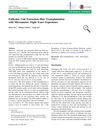Scalp med(R) effectively and safely improves hair count and thickness in men with androgenetic alopecia.
 1 citations,
December 2005 in “임상약리학회지”
1 citations,
December 2005 in “임상약리학회지” HDMHG0401-10 treatment significantly improved hair count and was better than a placebo in reducing hair loss in men with hereditary hair loss, with no major side effects.
[object Object]  January 2005 in “Translational and Clinical Pharmacology”
January 2005 in “Translational and Clinical Pharmacology” HDMHG0401-10 improves hair loss in men with androgenetic alopecia and has no major side effects.
January 2025 in “Journal of Ethnopharmacology” Dahuang-Gancao Decoction improves hair growth in androgenetic alopecia.
 10 citations,
October 2018 in “Dermatologic Therapy”
10 citations,
October 2018 in “Dermatologic Therapy” The lotion with equol, dihomo-γ-linolenic acid, and propionyl-l-carnitine was effective in reducing hair loss in men and women.
 August 2024 in “Stem Cell Research & Therapy”
August 2024 in “Stem Cell Research & Therapy” New regenerative therapies show promise for treating hair loss.
 July 2021 in “Research, Society and Development”
July 2021 in “Research, Society and Development” Minoxidil is effective and safe for hair growth in Androgenetic Alopecia, with manageable side effects.
 August 2024 in “Journal of Cosmetic Dermatology”
August 2024 in “Journal of Cosmetic Dermatology” Injectable treatments can effectively and safely improve hair growth in adults with androgenetic alopecia.
 August 2024 in “Quality in Sport”
August 2024 in “Quality in Sport” New treatments for common hair loss are needed.
 September 2023 in “Stem Cells International”
September 2023 in “Stem Cells International” Substances from fat-derived stem cells can promote hair growth and counteract hormone-related hair loss by activating a key hair growth pathway.
 1 citations,
January 2024 in “Journal of plastic, reconstructive & aesthetic surgery”
1 citations,
January 2024 in “Journal of plastic, reconstructive & aesthetic surgery” Stem cell-derived conditioned medium is effective in improving hair density and thickness for alopecia treatment.
 November 2024 in “Journal of Cosmetic Dermatology”
November 2024 in “Journal of Cosmetic Dermatology” PRP improves hair transplant results in androgenetic alopecia patients.
[object Object]  November 2024 in “Journal of Cosmetic Dermatology”
November 2024 in “Journal of Cosmetic Dermatology” Early treatment can reverse hair loss from dermal fillers.
 July 2020 in “Journal of Cosmetic and Laser Therapy”
July 2020 in “Journal of Cosmetic and Laser Therapy” Using your own platelet-rich plasma (PRP) can effectively treat hair loss, increasing hair density and width with no side effects.

Oral minoxidil effectively treats hair loss, with women needing lower doses (0.25 to 2.5 mg daily) and men needing higher doses (1.25 to 5 mg daily).
 5 citations,
October 2013 in “Clinics in Plastic Surgery”
5 citations,
October 2013 in “Clinics in Plastic Surgery” Hair transplant improves with regenerative medicine and FUE technique.
 2 citations,
July 2010 in “Clinical and Experimental Dermatology”
2 citations,
July 2010 in “Clinical and Experimental Dermatology” Delaying hair loss treatment reduces its effectiveness.
 52 citations,
May 2019 in “Journal of The American Academy of Dermatology”
52 citations,
May 2019 in “Journal of The American Academy of Dermatology” Low-dose oral minoxidil effectively improves male hair loss with mild side effects.
 47 citations,
October 2014 in “Expert Opinion on Emerging Drugs”
47 citations,
October 2014 in “Expert Opinion on Emerging Drugs” New alopecia treatments aim for better results and fewer side effects.
 45 citations,
September 2018 in “International Journal of Women's Dermatology”
45 citations,
September 2018 in “International Journal of Women's Dermatology” PRP shows promise for hair loss treatment, with three initial monthly injections and maintenance every 3-6 months.
 37 citations,
May 2018 in “Journal of Cosmetic Dermatology”
37 citations,
May 2018 in “Journal of Cosmetic Dermatology” PRP shows promise for hair loss treatment, but needs standardized preparation and composition.
 24 citations,
September 2019 in “Journal of The American Academy of Dermatology”
24 citations,
September 2019 in “Journal of The American Academy of Dermatology” Low-dose oral minoxidil improved or stabilized hair loss in some patients, but higher doses may be needed for significant effects.
 18 citations,
August 2019 in “Drug Development and Industrial Pharmacy”
18 citations,
August 2019 in “Drug Development and Industrial Pharmacy” Quercetin-loaded nanoparticles can penetrate skin, minimize hair loss, and promote hair regrowth, showing slightly better results than a marketed product.
 18 citations,
March 2014 in “Drug Development and Industrial Pharmacy”
18 citations,
March 2014 in “Drug Development and Industrial Pharmacy” New gel formulas without ethanol and propylene glycol, containing a minoxidil-methyl-β-cyclodextrin complex, have been created for treating hair loss.
 17 citations,
May 2015 in “Aesthetic Plastic Surgery”
17 citations,
May 2015 in “Aesthetic Plastic Surgery” FUE hair transplantation using a micromotor is effective and gives natural results with few complications.
 14 citations,
March 2019 in “Journal of Cosmetic Dermatology”
14 citations,
March 2019 in “Journal of Cosmetic Dermatology” Activated platelet-rich plasma helps hair growth by boosting growth factors and cell growth pathways in hair cells.
 12 citations,
October 2017 in “Journal of Cosmetic Dermatology”
12 citations,
October 2017 in “Journal of Cosmetic Dermatology” Combining plasma rich in growth factors with hair transplant surgery may lead to faster recovery and better outcomes for hair loss treatment.
 11 citations,
January 2012 in “International Journal of Trichology”
11 citations,
January 2012 in “International Journal of Trichology” Caffeine may help hair growth in hereditary hair loss.
 10 citations,
November 2019 in “Journal of Dermatological Treatment”
10 citations,
November 2019 in “Journal of Dermatological Treatment” Photobiomodulation helps hair growth safely in men and women, with laser devices working better than LED ones.
 10 citations,
August 2018 in “Dermatologic Surgery”
10 citations,
August 2018 in “Dermatologic Surgery” Laser treatment improves hair density and increases growth factors in androgenetic alopecia.



























